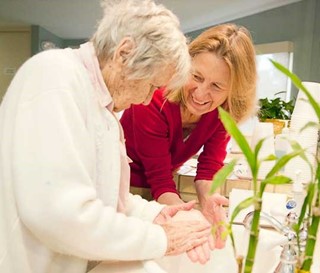Finding Beauty in the Present

Gillian Hamilton, M.D, Ph.D., has been fascinated with aging for as long as she has been in medicine. Gerontology, or the study of medicine in our aging population, is core to treating dementia. This specialty piqued Dr. Hamilton’s interest when she was a young volunteer at a local nursing home, eventually inspiring her to enter the medical field.
“One of the reasons I went into dementia (care) is to work with people who live in the present—that’s what we all struggle to do. When you visit somebody with dementia, you have to be in the present moment. And it's a gift,” Dr. Hamilton explained. “Because they often lack a robust life, you can really make a difference as a volunteer, or as a physician, or as a social worker.”
Dr. Hamilton was teaching students at Good Samaritan Hospital (now known as Banner-University Medical Center Phoenix) when she stumbled into an open-house exhibition run by Hospice of the Valley (HOV). HOV’s then-director, Susan Goldwater Levine, took an interest in Dr. Hamilton and offered her a full-time position with the organization after a chat. “Well, I already have a job,” Dr. Hamilton said. “But I could come four hours a week.” That was in 1996.
It didn’t take long for HOV’s unique and genuine approach to win her over. Dr. Hamilton now serves as the Medical Director of Supportive Care for Dementia. Her vision led to the creation of the Dementia Care and Education Campus, which provides comprehensive resources, caregiver support groups, an innovative intergenerational program with preschoolers, plus numerous education opportunities.
“Growing the Campus would mean that every minute of every day, there are people learning how to provide exquisite care to people with dementia,” she said. “I think we should have learners from everywhere. Every single discipline should be coming through every single day; nursing assistants, family, caregivers, everybody.”
That includes volunteers, who do not need previous experience. The impact of the campus and the volunteers with the Supportive Care for Dementia program are profound. “I think these volunteers completely change how they see aging and dementia. It's very cool. Because the caregiver, let's say, a wife, has been living with her husband for 35 years, but now has to take care of him,” said Dr. Hamilton.
“And then the student-volunteer comes in and just thinks he's wonderful. Just loves the stories he tells. And so the wife sees her husband in a different light. Because the student-volunteers see her husband in the present moment, [but] the wife is seeing everything she's lost. And so not only is it great for the patient, it's great for the caregiver because it pulls them back into the present to see the good things.”
Unfortunately, dementia is an illness that can intimidate a prospective volunteer. But the reality is very different. “It is a profound spiritual exercise. If that happens to be something that interests you, you will become a deeper person,” promises Dr. Hamilton. “And you will experience joy, laughter and happiness.”
Written by the ASU Cronkite Agency
